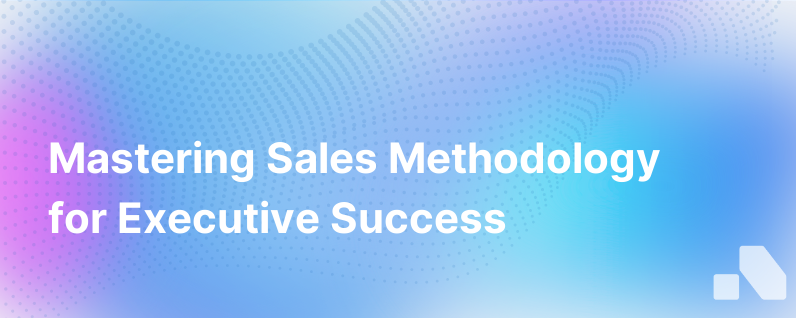Sales Methodology
Published on December 20, 2023 by David Zhang
In the realm of B2B sales, success doesn’t haphazardly tumble into your lap. It is the byproduct of a meticulously planned, rigorously applied sales methodology—a framework that dictates the "how" of selling, defining techniques and principles for guiding sales interactions from initial contact through to closing a deal.
From broadly known frameworks like Solution Selling to the more recent Inbound Sales Methodologies, choosing and tailoring the right method to align with customer needs, sales force skills, and business goals is not just wise, it’s essential. Let’s embark on a journey through the anatomy of sales methodologies, dissecting the core aspects and best practices that can catapult your B2B sales into the stratosphere.
The Essence of Sales Methodology
At its core, a sales methodology is a unique recipe that outlines how your sales team engages with prospects. Different than a sales process (which outlines the what and the when), methodologies delve into the subtler nuances—the psyche behind the pitch, the nature of the client engagement, and the strategic approach to advancing a sale.
A well-honed sales methodology enables your team to:
- Understand and reflect upon a prospect's unique challenges and needs.
- Navigate complexities in decision-making hierarchies within client organizations.
- Address skepticism with data-backed insights and personalized solutions.
- Advance deals through the sales funnel with precision and deliberation.
Anatomy of a Sales Methodology
Embarking on the development of a sales methodology is likened to assembling an intricate machine. Each part, crucial; each motion, synchronized. Here’s what makes up the DNA of a successful sales methodology:
1. Prospect Research and Targeting: The foundation upon which all else is built. Knowing who to sell to and why—is your prospect facing a pressing need your solution can alleviate?
2. Rapport Building and Active Listening: Entering the prospect’s world demands not just talking to them but forging meaningful connections. This stage is paramount to revealing deep-seated pains your product can address.
3. Needs Analysis and Tailored Solutions: The pivot from a canned pitch to a compelling, customized presentation that resonates with the prospect's specific conditions, aspirations, and hurdles.
4. Value Proposition and Consultative Selling: Moving away from features and focusing on benefits relevant to the prospect, highlighting the distinctive value your solution brings.
5. Handling Objections Proactively: Not merely a reactive measure, but a proactive part of your narrative. Anticipate skepticism and weave the answers into your dialogue.
6. Closing Strategies: Finesse your way through finish lines with closing techniques that are as informed and thoughtful as they are assertive.
7. Account Management and Post-Sale: Your relationship doesn’t end at the sale. Efficient post-sale practices can transform a one-time buyer into a lifelong client.
Selecting Your Sales Methodology
Determining the right sales methodology intertwines with your company's culture, the nature of your product, and most critically, your customers’ buying behavior. Here are a few established methodologies to consider:
Solution Selling: Best for complex sales environments where buyer needs are often nuanced, and products offer customizable solutions.
SPIN Selling: A four-phase questioning framework (Situation, Problem, Implication, Need-Payoff), most effective in high-value business sales.
Challenger Sales: Premised on delivering insights that challenge a prospect's thinking, pushing them towards a realization of need.
Inbound Selling: A buyer-focused approach that adapts to the educated, research-oriented modern buyer, aligning sales tactics with the buyer’s journey.
Tailoring Methodology to Match
No single methodology fits all. Your target market's nature might necessitate a hybrid model or call for the development of a proprietary approach. Customization can involve combining elements from several methodologies or innovating new techniques based on unique market insights.
Implementation and Consistency
The adoption of a sales methodology is an evolving procedure. It requires training, practice, monitoring, and consistent refinement. Tools like CRM software aid in institutionalizing a chosen sales method by offering templates for interaction and data-driven feedback on performance.
Technology as an Enabler
Today, platforms like Aomni leverage AI to optimize sales methodologies by giving teams access to real-time sales intelligence, providing actionable insights and helping draft sales narratives that resonate. Empowering reps with this smart technology can enhance the human elements of selling with substantial data and relevant information.
Best Practices
-
Ongoing Training and Development: A methodology is only as good as the team's understanding and execution. Prioritize regular training aligned with methodological goals.
-
Feedback Loops for Refinement: Analyze wins and losses. Understand what’s working (and what’s not) and revise your strategy accordingly.
-
Customer-Centricity: Keep the changing buyer landscape in perspective. Your sales methodology should evolve with buyer expectations and behaviors.
-
Adopt Tech Advancements: Integrate tools that can provide your team with a competitive edge and reduce time spent on account research.
Final Thought
A sales methodology isn’t a static set of practices, but rather a living, breathing playbook that guides your team to create meaningful exchanges with prospects. The power of a fine-tuned sales methodology can significantly increase your chances of closing deals and fostering enduring relationships.
At Aomni, we understand the dynamics of impactful sales methodologies and offer a suite of tools designed to amplify your sales team's performance. By empowering your B2B sales efforts with real-time data, competitive insights, and personalized sales content, Aomni assists in making your sales methodology not just feasible, but formidable.
Remember that at the end of the day, the path to elevated sales is paved with purposeful interactions, informed strategies, and a relentless pursuit of excellence. Choose your methodology with these tenets as your north star, and watch as your sales graph climbs with every intentional step.